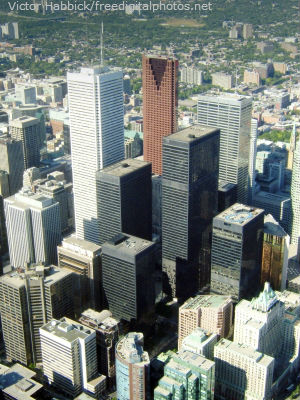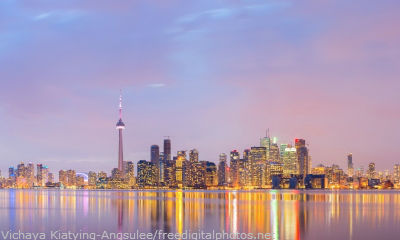Toronto is Canada’s most populated and well-known city. Its location on the shore of Lake Ontario, in Southern Ontario, makes it one of the warmest cities in Canada, as well. Toronto is relatively close to the neighbouring United States and attracts a lot of American visitors. It is considered an “international” city because nearly half of its residents were born outside of Canada. It is about as culturally diverse as North American cities get.

Toronto has varied activities for people of all ages. There is sailing on Lake Ontario, the record-setting CN Tower is a popular tourist destination, and the city is home to many professional sports teams. The Maple Leafs, Raptors, and Blue Jays all represent the city for the NHL, NBA, and MLB, respectively. For the NBA and the MLB, Toronto currently houses the only teams from Canada. Being a metropolitan hub, Toronto is also appealing for its dining options and nightlife. There is food, drink, and dancing for anyone who wishes to look for it.
There are plenty of reasons why you may want to move to Toronto. Before you pack your bags, make sure it is right for you by considering some other factors.
Toronto’s Climate
Toronto is relatively mild for a city in Canada and has a humid continental climate. It experiences the full effect of both summer and winter. Winters regularly get as cold as -10° C while summers can usually see 31° C. Its proximity to Lake Ontario provides it with typical weather altering effects associated with being near a body of water:
- Seasonal lag (seasons last longer)
- Lake effect snow/rain
- Moderate changes in temperature from day to night
- Windy conditions from the lake
Additionally, Toronto is a large urban region, which causes it to be a bit warmer than surrounding areas. Precipitation is possible at any time in Toronto, but it tends to happen more in summer. Generally the city isn’t particularly cold, hot, rainy or dry. It experiences all types of weather depending on the season.
Toronto’s Neighbourhoods
There are many distinct neighbourhoods in Toronto where residents live separated from the city’s commercial areas. Toronto gained even more neighbourhoods during its amalgamation in 1998, where it took in nearby municipalities as part of the city. East York, Etobicoke, North York, Old Toronto, Scarborough, and York retain their old distinct neighbourhoods, despite technically being part of the same city.
Neighbourhoods are often defined by income, home style, and the common ethnicity of people in the area. Despite Toronto’s diversity, immigrants still tend to stick together, so you can find many minority communities such as the city’s Chinatown.
No matter where you go, most neighbourhoods in Toronto are safe. Toronto has some of the lowest crime rates in North America for a city of its size. It still is a big city, however, and there is some gang activity in certain areas. Violent crimes still remain relatively low. Toronto’s typical homicide rate is 3.3 per 100,000. For comparison, Boston is at 10.3, Los Angeles at 10, and New York City at 6.3. Smaller Canadian cities do fare slightly better, however, with Montreal coming in at 2.6 and Vancouver with 3.1.
Registering Your Car
If you want to register your car for a move to Toronto, you need to get the necessary permits as per Southern Ontario regulations. Most fees associated with receiving plates, numbers, and certifications for your vehicle are more expensive for Southern Ontario than Northern Ontario, mostly because of Toronto.
There is additional paperwork to fill out if the car you are registering is used. If the car is over 20 years old, you face additional fees and certifications as well.
If you have the proper license, insurance, receipts, and a reasonably new vehicle, you should be able to register your vehicle without any problem. For more information on registering in Southern Ontario visit
Service Ontario’s website.
Toronto Schools
Toronto’s public primary and secondary schools are managed by the Toronto District School Board. There is also a Toronto Catholic District School Board that does the same for the public Catholic schools in the city. There are also French language counterparts to those school districts. Additionally, there are many private and preparatory schools in the city.
Toronto also has several post-secondary institutions. The biggest one is The University of Toronto, which is also Canada’s largest university. Ryerson University, OCAD University, and the University of Guelph-Humber are also located in Toronto.
 Toronto Employment
Toronto Employment
Toronto is Canada’s largest city, so it is an international hub of commerce and business. The Toronto Stock Exchange is the world’s seventh largest. The five biggest financial companies in Canada, called the “Big Five”, all have offices in Toronto.
Toronto also is a great media centre. Publishing, telecommunication, film production, and information technology are all well represented within the city. There are also several jobs created by the numerous sports teams that call the city home.
Most of the blue collar jobs are technically outside of the city limits of Toronto. However, the manufacturing industry is built largely upon workers commuting to factories from Toronto or its suburbs.
Toronto does a decent job employing its citizens--its unemployment rate was 8.1 percent in 2011.
Toronto’s Cost of Living
Toronto is consistently one of the most expensive places to live in Canada. Like most cities, there is a big variance in the average cost of living depending on where you reside. Monthly rent can range from $600 to $2800. Because of this, it is difficult to say the average costs of living will apply to anyone who moves to Toronto. If you must have an estimate, a modest cost of living including rent, public transportation, food, and utilities could be $1,300 a month.
Depending on the job, the average salary is quite high in Toronto, ranging from $40,000 to $70,000 for the middle class. As is typical, clerks and labourers tend to get paid less, and executives get paid more.
Generally speaking, Toronto is a relatively wealthy city. The cost of living is high because it is some of the most high profile real estate in Canada and all of North America.
Toronto Moving Resources
Have you decided to move to, or within Toronto? There are many moving companies that serve this highly populated area. When looking for moving estimates, remember to get at least three different quotes from three different moving companies. This ensures that you get a good idea of what your move truly costs. Check out our guides for additional tips on choosing moving companies. You can visit the following pages here on Topmoving.ca to get quotes for the indicated services in Toronto:
Toronto Transportation
Toronto is a heavily populated city, so public transportation is not only available, but advisable. It also is a major international hub, so cars, planes, trains, and boats all are constantly going in and out of the city.
There are a number of inter-city services in Toronto. It is even possible to ride buses and trains between the Canadian city and New York City in the U.S.
Public transportation within Toronto can be expensive, but it is necessary to avoid most traffic. However, there are numerous bike paths in Toronto, so if you have a bike and a short ride, that is the ideal way to get places.
The Toronto Transit Commission operates all public buses, streetcars, and railways that shuttle commuters within Toronto. A single flat fare is applied to most trips within the city, regardless of distance or destination. The TTC has the third highest ridership in North America behind the Mexico City Metro and the New York City Transit Authority.
Culture and Contemporary Life

Toronto is truly an international city. There are a wide range of cultures and classes represented within Toronto. Tolerance and diversity are values held dear in this multicultural town. There are a variety of cultural events and parades throughout the year that celebrate certain minority groups. As for fun, whether you are interested in art, dining, nightlife, sports, or shopping-- there is something for you in Toronto.
There is a myriad of museums that call Toronto home. The Royal Ontario Museum (ROM) is perhaps the most noteworthy. It focuses on natural history and world culture. Several other museums in Toronto are not as traditional. The Ontario Science Centre, the Bata Shoe Museum, and the Textile Museum of Canada all offer slightly more offbeat museum experiences.
In addition to all of the sports events played in the Air Canada Centre and Rogers Centre, there is also Toronto’s biggest tourist attraction, the CN Tower. This tower is the tallest free-standing structure in the Western Hemisphere and everyone who visits or lives in Toronto must visit it at least once.
The Toronto Eaton Centre is the city's most visited tourist attraction. It is a huge shopping centre/office office complex located in downtown Toronto. It has everything you would expect in a large mall including food, shopping, and entertainment. It gets roughly one million visitors a week!
Toronto Relocation Tips
- Due to the relatively low crime rate and the high cost of housing, consider the lower end housing options. Just remember to get a look at the neighbourhood before committing.
- If you don’t have a bike, get one to travel around the city cheaply.
- Although it is the most well-known Canadian city, Toronto is not prototypically Canadian. Half of the city’s population originated from outside of Canada and it is much warmer and more densely populated than the majority of the country.
- Despite its good reputation, Toronto is still a big city with some rough neighbourhoods. Don’t wander into unknown areas.
- If you get lost, ask for directions. The international community in Toronto is generally very helpful and friendly.
Helpful links
- The Official Site of Toronto: Toronto’s government provides a ton of information for residents, tourists, and those moving to the city. It also is a good way to look up laws and regulations.
- Thestar.com: The official website of the Toronto Star, the city's biggest online newspaper.
- Ontario Government: Find out the Provincial laws that govern Toronto, including how to register vehicles.
- Toronto Hydro: Official website of a major Toronto power company. Resources are available for those moving to the city.
- Toronto Education Directory: A resource that provides access to nearly all of Toronto’s public and private educational institutions.
- Toronto Transit commission: The official site of Toronto’s public transportation commission.